Friday, December 02, 2005
second issue of new Vancouver art tabloid The Fillip Review just arr'd over the transom & seems lively so far--articles by poet Donato Mancini, Lorna Brown, Aaron Peck, Lawrence Rinder on Richard Tuttle &c &c--& you have have to love a magazine whose statement of principles opens with a quote from Kevin Davies' "Karnal Bunt"....

a history of the Pineapple--
"Beauman calculates that once all the costs of a pinery are considered -- a stock of costly pineapple plants and pots and a glasshouse to contain them, a 40-foot stove to heat the glasshouse, a garden boy to tend the stove full-time -- the expense of a single English-raised pineapple in the second half of the eighteenth century was about 80 pounds, or 5,000 pounds in today's money. No wonder a single pineapple was often made to last for some time, "passed on from party to party until it began to rot so much it smelt out the whole household". By Victorian times, one horticulturalist claimed he had heard of a "single pineapple going the round of west-end dinner parties for some weeks". Beauman does not mention a similar assertion which I have come across elsewhere, that poorer middle-class families would even take to hiring pineapples for occasions when they wished to entertain, in order to appear grand, praying that no one would actually attempt to cut a slice."


Diary from Paris
"We shouldn't always expect a riot to mean something. There's been a carnival air about some of the destruction in France, and as anthropologists know, the meaning of carnival is to be found in the ordinary days of the calendar. The crudest question seemed simply to be whether there was anybody out there. Would anyone who wasn't the descendant of a Maghrebi or sub-Saharan migrant living in abject conditions be willing to acknowledge the existence of these conditions and the people afflicted by them? But with that came a threatening message about mistaken or ill-assigned identity that briefly clarified the cities like a flare over an earthworks: "we will become the people you imagine we are, just watch." It is the defensive-aggressive strategy that Sartre discerned in Genet's ostentatious criminality."
(photo--merci I.P.)

Thursday, December 01, 2005

"Bridge Construction-Morris, IL - 2003
oil on canvas" by Randy Dudley, whose "panoramic realist" view of the Gowanus Canal, reproduced in this month's "Art in America" was a striking view of a beloved landscape. I wish I could have seen the show.
"This landscape suggests, through its layering and overlapping of debris, structures, and accumulated rubble, a visual record of the past and present. This synthesis of histories is what gives the landscape its vitality. Gone are the stockyards, tanneries, steel mills, and gas works replaced by numerous smaller concerns, all of which leave behind their trace to the historic mix.
The industrial landscape, by virtue of its isolation, seems to resist change. This same isolation creates a menacing and alien landscape to some. But the inherent beauty of reflected light and local color combine with a stillness that permeates everything, creating a unique and inspired environment."

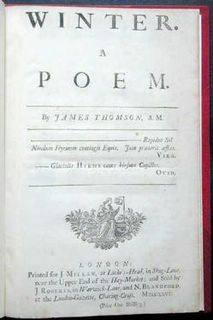
from another seasonal favorite, James Thomson's "Winter, A Poem"--I was obscurely hurt by John Ashbery (such a tender Clare devotee) describing Thomson's "Seasons" as "bland" in his otherwise admirable review of the Collected Kenneth Koch in Publisher's Weekly, but surely bland like good chewy oatmeal with cinnamon and walnuts rather than cream of wheat with skim milk and equal? My sentimental attachment to Thomson (another overweight underproducer, the Scot who wrote Rule Brittania & made The Castle of Indolence look easy!) precludes such judgement...
"FOR, see! where Winter comes, himself, confest,
Striding the gloomy Blast. First Rains obscure
Drive thro' the mingling Skies, with Tempest foul;
Beat on the Mountain's Brow, and shake the Woods,
That, sounding, wave below. The dreary Plain
Lies overwhelm'd, and lost. The bellying Clouds
Combine, and deepening into Night, shut up
The Day's fair Face. The Wanderers of Heaven,
Each to his Home, retire; save those that love
To take their Pastime in the troubled Air,
And, skimming, flutter round the dimply Flood.
The Cattle, from th'untasted Fields, return,
And ask, with Meaning low, their wonted Stalls;
Or ruminate in the contiguous Shade:
Thither, the houshold, feathery, People croud,
The crested Cock, with all his female Train,
Pensive, and wet. Mean while, the Cottage-Swain
Hangs o'er th'enlivening Blaze, and, taleful, there,
Recounts his simple Frolic: Much he talks,
And much he laughs, nor recks the Storm that blows
Without, and rattles on his humble Roof."

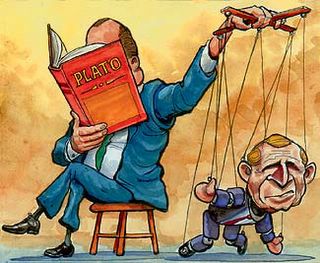
a must-read--Harper, Bush Share Roots in Controversial Philosophy
"The Calgary School has successfully hidden its program beneath the complaint of western alienation. "If we've done anything, we've provided legitimacy for what was the Western view of the country," Calgary Schooler Barry Cooper told journalist Marci McDonald in her important Walrus article. "We've given intelligibility and coherence to a way of looking at it that's outside the St. Lawrence Valley mentality." This is sheer Straussian deception. On the surface, it's easy to understand Cooper's complaint and the Calgary School's mission. But the message says something very different to those in the know. For 'St. Lawrence Valley mentality,' they read 'the Ottawa-based modern liberal state,' with all the negative baggage it carries for Straussians. And for 'Western view,' they read 'the right-wing attack on democracy.' We've provided legitimacy for the radical-right attack on the Canadian democratic state, Cooper is really saying."


Gary Indiana has an interesting review of "Brokeback Mountain" in this week's "Voice", but I'd missed or forgotten his sprited July 2004 defense of Bill Clinton's My Life--
""Regarding "My Life" itself, it is long. Yes. While I doubt that any of the reviewers who have disparagingly compared it to the memoirs of Ulysses S. Grant have ever actually read the latter, I also doubt that they have read the former. Say what you will about Clinton, but he is one of the few U.S. presidents since Grant to have written a book by himself. While reading it I often wished someone else had written it for him, since he clearly has a tin ear and little sense of what to include and what to leave out. All the same, it's impossible to actually read this book without missing Clinton, for unlike his predecessor and his successor, the Spook and the Born-Again Cokehead/Booze Hound, he isn't mean-spirited, homophobic, racist, or idiotic, never confuses himself with Jesus Christ, and even when putting annoying people in their place, does it with a light touch. "Unfortunately, my relationship with Bill Bennett didn't fare well after I became President and he began promoting virtue for a living." "Vice-President Dan Quayle said he intended to be the 'pit bull terrier' of the election campaign. When asked about it, I said Quayle's claim would strike terror into the heart of every fire hydrant in America." Clinton is even gracious to Barbara Bush, a vicious old bag in pearl sets who could've given Angela Lansbury notes for her role in The Manchurian Candidate."


"19 November 2005, Asematunneli
Sanna (14) and Nina (14)
"We are going to a meeting of j-pop fans. Our style idols are Japanese artists like Mana-sana. It's easy to find nice clothes but they are too expensive. We like to shop at Backstreet and Morticia. We are wearing this chain because we are friends."
via Metafilter HEL LOOKS, devoted to the remarkable street fashion of Helsinki...

Wednesday, November 30, 2005
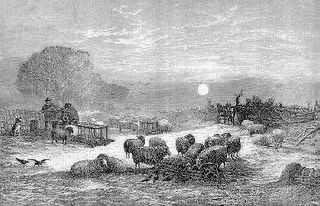
from William Cowper's The Winter Morning Walk, a poem I always think of, my first walk in the snow, any given year--
"The verdure of the plain lies buried deep
Beneath the dazzling deluge; and the bents,
And coarser grass, upspearing o'er the rest,
Of late unsightly and unseen, now shine
Conspicuous, and, in bright apparel clad
And fledg'd with icy feathers, nod superb.
The cattle mourn in corners where the fence
Screens them, and seem half petrified to sleep
In unrecumbent sadness. There they wait
Their wonted fodder; not like hung'ring man,
Fretful if unsupply'd; but silent, meek,
And patient of the slow-pac'd swain's delay.
He from the stack carves out th' accustom'd load,
Deep-plunging, and again deep-plunging oft,
His broad keen knife into the solid mass:
Smooth as a wall the upright remnant stands,
With such undeviating and even force
He severs it away: no needless care,
Lest storms should overset the leaning pile
Deciduous, or its own unbalanc'd weight...."


short piece on Mike Kelley doesn't get into the new show, unfortunately, but good anyway--
"I make art," Kelley once said, "in order to give other people my problems."


From below The Orient, Ayr, as the website has it
"Opened in 1932. Bingo since 1983, then a nightclub, now derelict.
Originally had atmospheric interior; this has been lost."
Across the bridge and across the street from the Carnegie Library--had a very lux interior, blue carpeting with gold flecks but I probably misremember. Was cheaper than the Odeon and there was a threepenny discount for the first eight rows, where I still like to sit.


the Odeon in Burns Square, Ayr, fromCinemas in Scotland, subdivided into four now but surviving, saw many movies here, was memorably evacuated from it during a showing of the Rod Steiger "Napoleon", when someone phoned in a bomb scare--'71?? Dad nipped into the pub across the square for a quick one but we were back in our seats in less than half an hour.

Tuesday, November 29, 2005

Happy Birthday William Blake!
from America: A Prophecy--
"Washington, Franklin, Paine, and Warren, Gates, Hancock, and Green
Meet on the coast glowing with blood from Albion's fiery Prince.
Washington spoke: `Friends of America! look over the Atlantic sea;
A bended bow is lifted in Heaven, and a heavy iron chain
Descends, link by link, from Albion's cliffs across the sea, to bind
Brothers and sons of America; till our faces pale and yellow,
Heads depress'd, voices weak, eyes downcast, hands work- bruis'd,
Feet bleeding on the sultry sands, and the furrows of the whip
Descend to generations, that in future times forget.'
The strong voice ceas'd; for a terrible blast swept over the heaving sea:
The eastern cloud rent: on his cliffs stood Albion's wrathful Prince,
A dragon form, clashing his scales: at midnight he arose,
And flam'd red meteors round the land of Albion beneath;
His voice, his locks, his awful shoulders, and his glowing eyes
Appear to the Americans upon the cloudy night."


thoughtful Ted Berrigan recollections at fait accompli, whose Nick Piombino I met, a fellow floater, amidst the swirl and light of the Mike Kelley show at the Gagosian a couple of weeks back--
"Berrigan was talking about the fact that when we read contemporary poetry there is an *electric* (instantaneous) quality to our contemporary way of reading that is unique to our era. He used Ashbery's Tennis Court Oath as an example. He was saying that we don't stop to think about each word the way we read poetry now. We engulf the pages instantaneously, ravenously. As he spoke about this, he kept pulling on the chord of the electric light hanging from the ceiling over and over turning excitedly turning it on and off. He made me realize that when we read poetry now we read with the speed of light, the speed of thought, so it should be written and presented with this factor in mind. His Sonnets helped make this an era of lightning fast poetry, He also spoke of the loss of nobility in poetry as well, so he was aware of the price that we might be paying for this type of insatiability. But I think he, and the New York School in general, did much to counter the mournful tones of so much 20th Century poetry: ("I grow old, I grow old, I will wear the bottom of my trousers rolled... I have seen them singing each to each...I do not think that they will sing to me")"

Monday, November 28, 2005
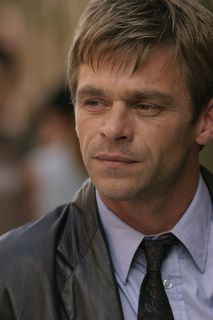
looking forward to Chris (DaVinci) Haddock's Intelligence (with Ian Tracey, pictured) on CBC tonight.
"His goal, Haddock says, was "to do something we don't see much of, which the Brits tend to do, which is an espionage thriller. The Americans do it, but it's often quite cliched; they do an exaggerated action-adventure approach to it. I thought the genre of real espionage thrillers was really unexplored and it would be something fresh.
"I think there's an appetite for it. Just worldwide, you have everybody questioning the sources of information and veracity of information."
Moreover, he envisioned Intelligence as being told from "not the top down but from the bottom up."
Haddock hopes by doing so he can create the sort of topical, potentially incendiary drama that generates conversation " not just thrills " among audience members. Specifically, he references the films of the 1970s " movies that reflected the Watergate era. ""

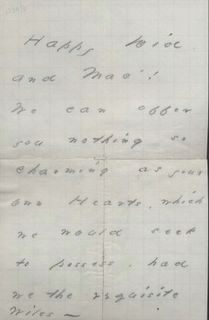
The Problem With Emily Dickinson from
"Elements of Literature for Christian Schools," by Ronald Horton, Donalynn Hess and Steven Skeggs (Bob Jones University, 2001)
"Several of her poems show a presumptuous attitude concerning her eternal destiny and a veiled disrespect for authority in general. Throughout her life she viewed salvation as a gamble, not a certainty. Although she did view the Bible as a source of poetic inspiration, she never accepted it as an inerrant guide to life."

Subscribe to:
Posts (Atom)